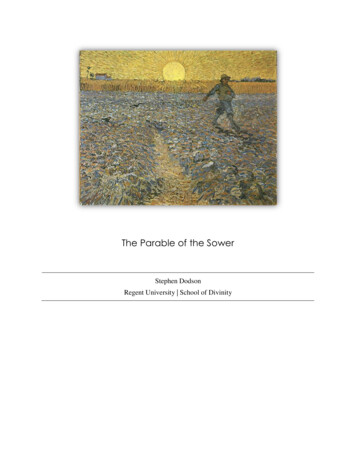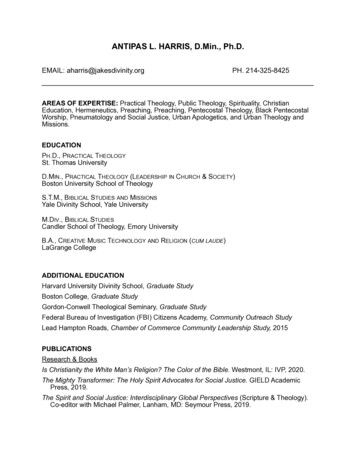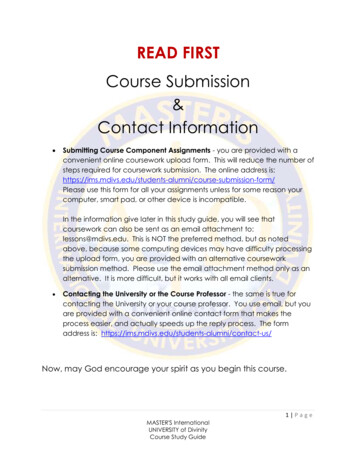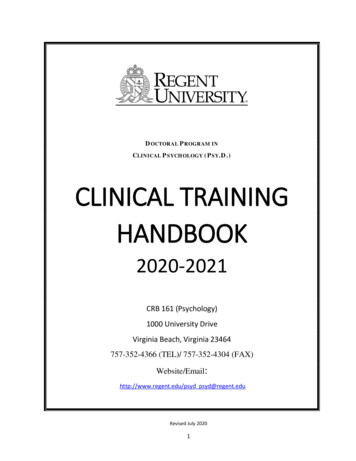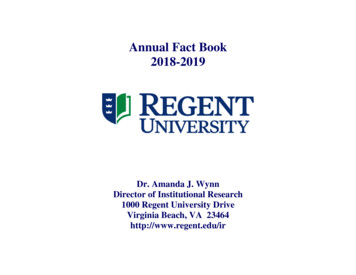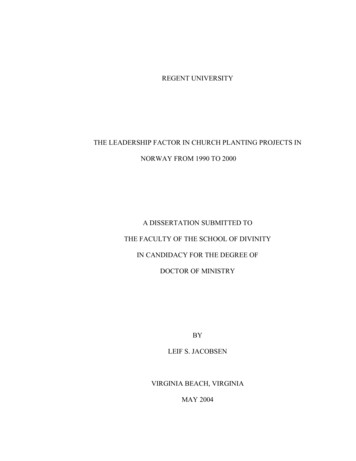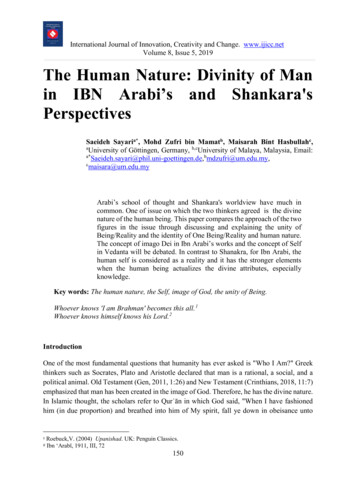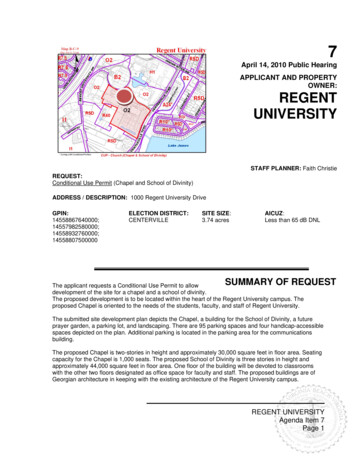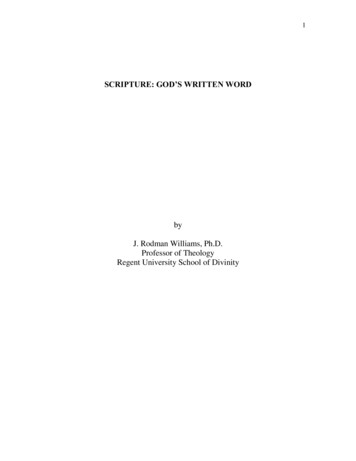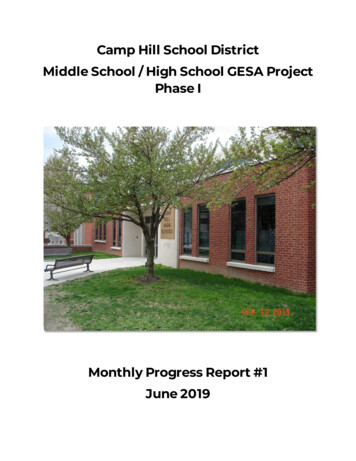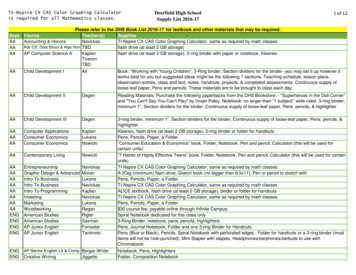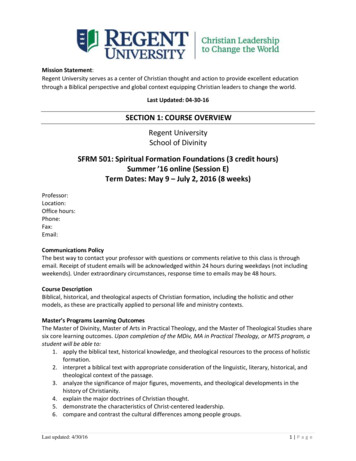
Transcription
Mission Statement:Regent University serves as a center of Christian thought and action to provide excellent educationthrough a Biblical perspective and global context equipping Christian leaders to change the world.Last Updated: 04-30-16SECTION 1: COURSE OVERVIEWRegent UniversitySchool of DivinitySFRM 501: Spiritual Formation Foundations (3 credit hours)Summer ’16 online (Session E)Term Dates: May 9 – July 2, 2016 (8 weeks)Professor:Location:Office hours:Phone:Fax:Email:Communications PolicyThe best way to contact your professor with questions or comments relative to this class is throughemail. Receipt of student emails will be acknowledged within 24 hours during weekdays (not includingweekends). Under extraordinary circumstances, response time to emails may be 48 hours.Course DescriptionBiblical, historical, and theological aspects of Christian formation, including the holistic and othermodels, as these are practically applied to personal life and ministry contexts.Master’s Programs Learning OutcomesThe Master of Divinity, Master of Arts in Practical Theology, and the Master of Theological Studies sharesix core learning outcomes. Upon completion of the MDiv, MA in Practical Theology, or MTS program, astudent will be able to:1. apply the biblical text, historical knowledge, and theological resources to the process of holisticformation.2. interpret a biblical text with appropriate consideration of the linguistic, literary, historical, andtheological context of the passage.3. analyze the significance of major figures, movements, and theological developments in thehistory of Christianity.4. explain the major doctrines of Christian thought.5. demonstrate the characteristics of Christ-centered leadership.6. compare and contrast the cultural differences among people groups.Last updated: 4/30/161 P a g e
In addition to the above six shared outcomes, upon completing the MDiv program, each student willbe able to:7. demonstrate proficiency in the skills of ministry.8. synthesize biblical, historical, and philosophical knowledge to articulate a theological position.In addition to the above six shared outcomes, upon completing the MA in Practical Theologyprogram, each student will be able to:7. defend a theological position pertaining to church practices and society.8. apply ministerial knowledge to a vocational context.In addition to the above six shared outcomes, upon completing the MTS program, each student willbe able to:7. defend a theological position on biblical, historical, and philosophical grounds.8. incorporate global ecumenical sources in their theological research and writing.Relationship of course to Regent’s MissionMission: Regent University serves as a center of Christian thought and action to provide excellenteducation through a Biblical perspective and global context equipping Christian leaders to change theworld.1. Biblical Perspective: Christian formation is predicated on the biblical theology related to thelove of God for humanity as expressed in creation and the four aspects of salvation: justification,redemption, sanctification and forgiveness. This interactive process concerns the changes andspiritual development of the believer as God forms, conforms, and transforms believers toreflect the image of Jesus Christ through God’s gracious actions in and for the believer and thebeliever’s response to God’s loving actions. These actions result in progressive formation (inspirituality): conformation (to the will of God) and transformation (into the likeness of Christ).Relevant Scripture passages and narratives that address Christian formation from theperspective of human wholeness, as biblically understood, will be discussed. Daily Scripturereading and reflective journaling further anchor class participants in discerning God’s voice andresponding in obedience. Other course components explain and provide opportunities topractice several Christian spiritual disciplines (i.e., prayer, personal and corporate worship,meditation, personal reflection, and engaging in intentional community). Overall, this biblicallybased approach to formation encourages a maturing relationship with God and others, as wellas growth in Christlikeness in several dimensions: (a) spiritual, (b) emotional, (c) relational, (d)intellectual, (e) vocational, (f) physical health and wellness, (g) formation in the use of financialand other resources. The culminating portfolio assignment, which includes these sevendimensions, incorporates the development of core values and the continuing process of growthand development in Christ as supported by Scripture.2. Global Context: In this course, Christian formation also concerns how believers’ relationshipswith God and others include an overarching global perspective. Class participants learn toidentify and pursue life vision, mission, vocation (calling), and spiritual gifts with the goal ofloving and serving God and others in the world, based on a biblical understanding of lifepurpose. Understanding how one is formed in Christ empowers the believer to cooperate withGod in becoming an instrument of blessing to others for the glory of God and for the good ofhumanity. Serving Christ in the world contributes to a global perspective, whether serving athome or abroad, as the love of God is manifest in and through the believer’s life and vocation.Last updated: 4/30/162 P a g e
SECTION 2: COURSE REQUIREMENTSCourse Learning Outcomes (with match to Program Outcomes)Upon completion of this course, students should be able:1. CLO 1: To apply the biblical text, historical knowledge, and theological resources to the ongoingprocess of holistic formation.[Assignments: Reflective Bible reading and journaling, online interaction throughdiscussion boards, blogs, and/or Collaborate live classrooms; case study analysis;Christian formation portfolio; and classroom participation].2. CLO 2: To engage in spiritual disciplines comprised of Scripture reading, study, and meditation;prayer; worship; journaling; and interactive community that supports ongoing growth inChristian formation.[Assignments: Reflective Bible reading and journaling; in-class or online interactionthrough discussion boards, blogs, and/or Collaborate live classrooms; portfoliodevelopment; peer groups; classroom participation].3. CLO 3: To participate actively in a class/small group experience, whether in-person or online,around the resource Steps to Freedom in Christ, and other relevant course resources, whichcontribute to personal, spiritual, emotional, and relational wholeness.[Assignments: Steps to Freedom in Christ peer groups; Steps to Freedom in Christwritten reflection for inclusion in the student’s portfolio; in-class or online interactionthrough discussion boards, blogs, and/or Collaborate live classrooms; portfoliodevelopment; classroom participation].4. CLO 4: To formulate written vision and mission statements that reflect current vocational foci,and develop a written spiritual gifts assessment profile that incorporates how the results relateto current and future ministry and leadership involvement.[Assignments: Development of vision and mission statements and written giftsassessment profile for inclusion in student’s portfolio].5. CLO 5: To complete a Christian formation portfolio incorporating specific growth plans in thefollowing areas: (1) personal spiritual/faith formation; (2) emotional formation and maturity; (3)social/interpersonal formation; (4) theological/intellectual formation; (5) vocation/ministerialformation; (6) physical health/wellness formation; and (7) resource formation and stewardship;which will serve as an ongoing document of personal Christian formation and continuing growthin Christ.[Assignment: Portfolio development and submission of same as culminatingassignment].6. CLO 6: To assess a case study from the perspective of the integration of Christian formation andscience relative to physical health and wellness.[Assignment: Case study analysis].Last updated: 4/30/163 P a g e
Course Objectives (specific tasks/assignments with match to CLOs)AssignmentsAssignment 1: Online DialogueAssignment 2: Class Collaborate SessionAssignment 3: Reflective Bible reading andjournal writingAssignment 4: Peer Group case study analysisAssignment 5: Peer group meetingsAssignment 6: Christian formation portfolioCLO1XXCourse Learning OutcomesCLO2 CLO3 CLO4CLO5XXXXXXXXXXXCL06XXDescription of how faith and learning will be integrated in the courseThis course explicitly derives from biblical and theological foundations, in addition to the witness ofChristian history, relative to how believers are formed, conformed and transformed in Christ throughthe power of the Holy Spirit according to the Father’s will (Eph. 1:17-19; Eph. 3: 16-19). The centrality ofChrist in the journey of faith informs the Christian formation process, underscoring that in Christ “arehidden all the treasures of wisdom and knowledge” (Col. 2:3) and that through the Spirit one is “beingtransformed” into Christ’s likeness (2 Cor. 3:17-18).The primary textbook for the class is the Bible, whereas the other required texts augment students’understanding as to biblical, theological, and historical realities of formation and how believers maycooperate with God in the Christian formation process. Course readings, discussions, presentations,small group interaction (i.e., encouraging the development of intentional community), and theunderstanding and practice of spiritual disciplines form an integrative process to assist seminarians inapplying Christian formation principles and practices in their personal and ministry contexts,contributing to the achievement of faith and learning goals.Course ProceduresAttendance In order to receive credit for a course, students must attend a minimum of 70% of courses which have aresidency or an on-campus requirement. Whether the course is standard, modular or hybrid in type,residency is an essential component of the requirements for these courses. Merely completing theassigned work is not sufficient to receive a grade for courses that have a residency requirement. Thisapplies to masters and doctoral courses in the School of Divinity. NOTE: particular courses may assigncredit for attendance and discount the final grade for a lack of attendance, even above 70% (see coursesyllabus for particular procedures and requirements). Note that online courses also require regularparticipation as specified in the relevant course syllabus.Blackboard Requirements –Blackboard will be utilized for various components of this course (please refer to the course syllabus andcourse schedule).Late assignment penalties –Assignments that are submitted after the submission deadline will be accepted without penalty only ifprior arrangements have been made beforehand with the instructor due to extenuating circumstancesbeyond the student’s control and/or in true emergencies. In such situations, the instructor should becontacted as soon as possible to request submission extensions. All such arrangements are subject tothe approval of the instructor on a case by case basis. Aside from extenuating circumstances listedabove, all assignments submitted after the submission deadline will incur a 3-point deduction for eachLast updated: 4/30/164 P a g e
day the assignment is late. After three days, the assignment will not be accepted. No extensions will beconsidered when extension requests are received after the assignment deadline. For purposes of thiscourse 12:01 a.m. (EST) will be considered the beginning of a new day.Class participation Please note that students must participate in this class within the first week of the term or risk beingdropped for non-participation. Simply logging in through Blackboard is not considered participation. TheUniversity’s Graduate Catalog defines participation in the following way: “Students who have notphysically attended an on-campus course, or who show no participation in any academic activities for anonline course will, at the end of the add/drop period, be administratively withdrawn from that course inaccordance with university practice. “Academic activity” includes submitting an assignment, taking anexam or tutorial, engaging in computer-assisted instruction, participating in online discussion aboutacademic matters, or initiating contact with a faculty member to discuss academic matters concerningthe course.” The simplest way to participate in this course during week 1 is by engaging in theIntroductory Dialogue in Blackboard’s Discussion Board.Academic Honesty Students are on their honor to complete assignments with integrity. This means that all writtenassignments, reading reports, exegetical observations, and term papers are to reflect the student's ownwork and have been submitted for credit only in this course. Where other secondary sources are used,appropriate acknowledgement with the proper use of parenthetical citations/endnotes/footnotes mustbe adhered to. Relative to the entire course of study, it must be assumed that cheating and plagiarismare sins contrary to God's laws and the mission of Regent University. Plagiarism is using the intellectualproperty of others without proper citation to give the impression that it is the student's own work. Theprofessor's instructions concerning "take-home, closed-book" exams are to be honored. Students areresponsible for following all policies of academic honesty and integrity included in the StudentHandbook. Charges of violating academic integrity shall be handled according to established studentdiscipline procedures published in the Student tudentHandbook.pdfRequired and Supplemental ResourcesStudents are expected to have all required materials by the first day of the semester.The Regent University Bookstore website is: http://www.cbamatthews.com/regent/Additional materials (e.g., articles, etc.) may be found in the Content section of Blackboard.REQUIRED: The Bible (Any translation –avoid paraphrase editions). The Bible is the primary course text andfoundational source for all other course materials. Daily Scripture reading will be assigned byyour professor. Selected readings available in Blackboard on the topic of the integration of Christian formationand science, as it pertains to physical health and wellness. Anderson, Neil. The Steps to Freedom in Christ (paperback revised edition, Oct. 2001). GrandRapids, MI: Baker, reprinted 2014. ISBN: 9780764213755This step-by-step guide is a means for seminary students to resolve personal and spiritualconflicts, to gain freedom in areas of emotional struggle, and to learn the process requiredfor spiritual formation and discipleship. Smith, James Bryan. The Good and Beautiful God: Falling in Love with the Jesus God Knows.Downers Grove, IL: InterVarsity Press, 2009. ISBN: 9780830835317Last updated: 4/30/165 P a g e
This book is the first of three books in “The Apprentice Series” by James Bryant Smith. Ourimage and ideas about God, to a large degree, affect how we relate to God and live our lives.Smith focuses on the character of God in order to shine light on where our ideas and imagesof God are untrue and to allow the truth of Scripture to transform false notions of God, self,and others, which impact daily living. Fortune, Don & Katie. Discover Your God-Given Gifts (Revised and Expanded Edition). GrandRapids: Baker Publishing, 2009. ISBN: 9780800791087This text presents the primary motivation gifts and how these giftings relate to ourpersonalities, our relationship with others, and our ministries. This book further assistsstudents to identify their motivational gifts and understand ways of relating to andministering to others, all helpful in discerning one’s vocational calling.RECOMMENDED SUPPLEMENTAL RESOURCES: A recommended reading list is posted in Blackboard’s “Start Here” section. These resources arenot required but not required.Method of Evaluating Student Performance (Assignments).The following assignments comprise the requirements for successful course completion. Beforebeginning each assignment, check the Grading Rubrics located in the "Start Here" section ofBlackboard to see how each assignment will be evaluated. All assignments are due by the dateindicated in the Course Schedule under “Assignment Due” by 11:59 p.m. (Eastern Time) of thatrespective day. See the Late Submission Policy on pages 4-5 under “Late Assignment Penalties.”A. Thoroughly review all content in the “Start Here” Section of Blackboard: (1) then download to yourcomputer the syllabus, course schedule, grading rubrics, and suggested reading list; (2) read theuniversity policies and download all free software; and (3) review the School of Divinity policies andprocedures. To be completed before the start of class.B. Introductory dialogue (week 1, 3% of grade): 4 posts total to include: 1 original post of between150-200 words by Tuesday of week 1, and 3 response posts of at least 100 words to others’ originalposts, posted evenly over the week. In your original introductory post, mention a bit about yourself,your current role or work situation, your family, and your ministry/academic experience and aspirations.Stay within the requested word limits for conciseness. Post a photo of yourself in your original post ofintroduction. When you respond to others, please address them by name. Please check the GradingRubrics to see how this assignment will be evaluated.C. Daily Spiritual Formation & Renewal. Daily reading of the Scriptures is essential for lifetransformation. Therefore the Scriptures will provide the basis for your devotional reading during thiscourse. The devotional reading guide is provided under “Materials” in Blackboard, along with CourseContent (Week 1). Or a student may design his/her own Scripture reading plan and submit it to theprofessor for prior approval, no later than Monday prior to the first day of the semester. A one-yearBible that includes Scriptures from the Old and New Testaments and also the Psalms and Proverbswould be ideally suited for this devotional reading. A minimum of four chapters each day are to be read.This intentional time of focused spiritual reading and prayer undergirds all other class assignments.D. Spiritual Journals based upon Scripture reading (20%). This assignment, based on your devotionalScripture reading, using the Devotional Reading Guide posted in Blackboard’s Course Content/wk. 1 andalso in the “Materials” tab from the main menu), is to be completed on a weekly basis over weeks 1-5and comprises a total of five journals. Journals 1-3 (8%) are due in Blackboard as one file on the Sat. ofLast updated: 4/30/166 P a g e
week 3. Journals 4-5 (7%) are due in Blackboard as one file on the Sat. of week 5 – both by 11:59 p.m.(Eastern Time). View the sample journals posted in Blackboard’s Course Content (wk. 1)!Each journal should be at least two full typed pages, double spaced (but no more than threepages), in Times New Roman font (12 count). Please type the heading in single space at the top of afresh page for each individual journal: (a) your name, (b) the journal # and week # (i.e., Week 1), (c)date, and (d) what Scriptures you have read for that particular week. Submit the specified journals inone document, not as separate files, with the entire document being page numbered (top rightcorner). The process of journaling is a means of prayerful reflection, in the classic tradition ofmeditating on the Word of God to help clarify, integrate, and enrich the other required text readings. Ineach journal, you will journal on 2-3 main areas that the Lord has spoken to you throughout the weeklyreading. See the sample journals posted in Blackboard under Week 1 of “Course Content” forformatting requirements.Writing Your Weekly Spiritual Journal. What is a spiritual journal? A spiritual journal involvespersonal writings as reflections from your spirit, as guided by the Holy Spirit. This
Regent University serves as a center of Christian thought and action to provide excellent education through a Biblical perspective and global context equipping Christian leaders to change the world. Last Updated: 04-30-16 SECTION 1: COURSE OVERVIEW Regent University School of Divinity S
